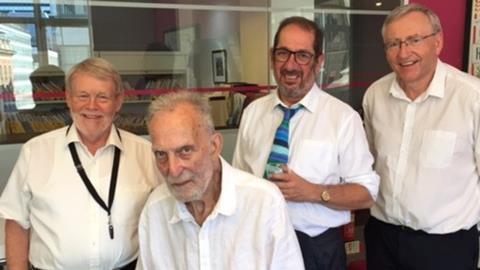Philip Canter, a distinguished and long-serving member of the Liverpool legal profession, died on 19 September 2024. I and many others owe him a great debt of gratitude.
It was in 1961 that Howard Jackson and Philip set up their law firm, trading as Jackson & Canter. They were legal pioneers, the first local law firm to set up offices near to where clients lived rather than expecting clients to come to the centre of Liverpool to see them. They also cut out the formality of being legal professionals, set on a pedestal, a cut above their clients.
Their office in Rialto Buildings in Liverpool 8 became a place where the black community came to fight their corner against the sometimes oppressive and racial prejudiced Merseyside police force. Their principal weapon was Philip Canter, a tall, softly spoken individual with a droll sense of humour and relaxed air, who had an utter determination that the marginalised should have a chance of achieving justice in a system heavily weighted against them.
Black youths were likely to be charged with the offence of SPL - Suspected Person Loitering. All the police had to prove was that they had observed a suspect loitering in the vicinity of a motor vehicle and also behaviour which made them suspicious that an offence might be committed. In the subsequent trial, the police officer would ask the magistrates if they ‘could refer to their note book’, whence they would trot out a spiel which was remarkably similar whatever the circumstances and whoever the officer, a fact which Philip used forcibly and relentlessly in his cross-examination. This often resulted in an acquittal.
It took the Toxteth uprising, in which our office was burned down, and the subsequent Police and Criminal Evidence Act to gradually change the culture of the local force; but Liverpool’s black community faced injustice for many years and probably still does so today. Philip was instrumental in helping to bring about an improvement in this situation. I joined Philip in 1975 and worked with him until 1986, when he emigrated to Israel where he stayed for seven years. He quickly qualified as an Israeli lawyer which was a remarkable achievement at that stage of his career. When he returned from Israel, he continued his criminal justice career in Liverpool, working first for Deacon Goldrein Green, then for Gregory Abrams Doherty, and latterly KWP Solicitors, where he undertook advocacy in the magistrates’ court until well into his eighties.
Philip was a dedicated family man, married to Anita who escaped from Denmark before Nazi occupation. They were a lovely couple, interested in the arts and books. Philip was also interested in sport, and in particular golf. They were life-long socialists and supporters of the Labour Party.
Philip’s Jewish faith was an integral part of the person and family man he was and at his funeral, Rabbi Abel, himself a lawyer, talked about how in Philip, faith and dedication to justice were totally interconnected. Philip was certainly an inspiration to me at the start of my legal career and to others who worked with him. The firm he helped to found still carries the same ethos and imperative of making a positive difference through the practice of law that he so ably exemplified.
Andrew Holroyd, Jackson Lee’s head of risk and compliance, and a former president of the Law Society, was a long-time colleague of Philip Canter.
This article is now closed for comment.
































5 Readers' comments